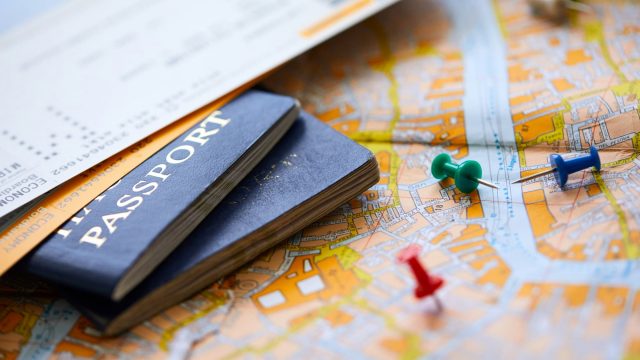It’s that time of year when Halloween is on everyone’s mind. Spooky tales and scary stories are all we can think about. To us, there’s nothing more scary than travel scams. When you’re far away from home everything can feel far more threatening and panic inducing.
To protect you from these dastardly scams, we’ve put together a list of the top 10 most common ones. These scams come in two main situations, when you travel in a taxi abroad, and when walking down busy streets abroad. We’ve documented the most popular scams in each situation and how you can protect yourself!
The taxi of nightmares and extra cash.

Taking a taxi in a new city and country can be quite a spooky ordeal. There’s a language barrier, you’re not sure where anything is, and new currencies can be confusing to work out quickly. This all leads to a lot of confusion. Which isn’t great for you, but works wonders for mischievous, unlicensed taxi drivers.
This spooky scam is simple, you jump in a seemingly innocent taxi, say where you want to go, and the taxi driver sets off. When the ill-meaning driver realises you’re new to the location there’s a few easy ways they can try to scam extra money out of you.
The long way around. The driver knows you don’t know the place that well, so they’ll take a long route, accruing time and extra cost. This is easy to do if you don’t know the city well.
The broken meter. Some metered cabs have a little display which shows the current cost based on how far the taxi has driven. Keep an eye on this meter. If it’s rising fast you may be getting scammed.
The price hike. This one is simple, you get in, say your destination and the driver quotes you a ridiculous price straight away. No driving the long way or broken meters, just a simple scam.
The closed destination. You get into you cab and when you say the destination, surprise, surprise, your tourist attraction is closed today. This is a lie of course. The driver will then offer a new destination, one that happens to be much further away and cost quite a bit more.
Avoiding these scams. Luckily, these scams are quite easy to avoid with a bit of Googling and local help. Have a quick search on Google maps before getting in any taxi to get a rough idea of the quickest route. Set up navigation to ensure your driver stays on track. You could ask trusted locals how much roughly the journey should cost and refuse any taxi who quotes higher. The simplest way though, is to always, always, always use a licenced cab. Avoid unlicensed ones at all costs. For the closed destination trick, always check before you travel so you know If they’re trying to dupe you.
Daylight robbery

Villainous locals can spot an unsuspecting tourist a mile away. It’s quite clear if you’re new to the area this may make you a prime target for scary street scams. Being in a new place can be daunting, there’s so much going on, new languages everywhere, different sights, smells and sounds all around you. It’s easy to become a bit flustered by it all and unfortunately, this makes you an easy target. Let’s go through some of the most common street scams.
The spill. You’re walking down the street and suddenly a stranger bumps into you, spilling their food or drink all down you. As they apologise profusely in a language you don’t understand and attempt to help you clean up, they or their friends are pickpocketing you. In all the commotion you don’t realise.
The petition. This is a guilt trip in every sense of the phrase. A charity worker, or, someone who looks like a charity worker, approaches you and berates you in a foreign language to sign in support of their cause. Of course, this comes with a hefty donation. Often any donation you do make will never see the charity anyway and the minimum donation is always inflated.
Short-changed. Foreign money is always tricky to work out and dastardly shopkeepers know this. If they’re out to scam you, they’ll claim you gave them less money than you did. This makes you fork out more than you need to. If not this, they’ll pass you back your change very slowly hoping you’ll leave before they’ve given it all to you. Finally, they may just straight up short change you.
The choosing beggar. Another guilt trip, this sneaky trick pulls right on your heartstrings and your wallet. A poor looking child will beg you for money, claiming to be blind, deaf or homeless. When you succumb and give them money, they may simply snatch your wallet or purse or just note where it’s stored on you for easy pickpocketing later.
The group-photo. You just want a lovely selfie with the pretty scenery behind you. When your party gathers to take the photo, a lovely local will offer to take the photo for you. You all get ready for your picture, show your best side and sort your hair out and… your cameras been nicked. They’ve run off. This also works if a local claims to need to use your phone for an emergency call.
The give and take. This is a simple one too. A local looking to scam you will place something on your person, maybe a small bit of string or something equally innocuous. Once you realise and attempt to throw it off, they’ll claim you purchased it and demand money. This can also work at tourist attractions. Sellers may give you an item to hold or look at, and then demand money.
Avoiding these scams. It’s easy to avoid scams like these if you’re aware of them. The simplest way is to always be aware of where your money is. Keep is somewhere zipped up and not obvious on your person. Only carry the essentials and avoid showing where your wallet or purse is stored in public. Don’t let pickpockets know where to target. For the shopkeeper scams, make it clear you know the currency, announce how much you’re handing over and say the amount of change you’re expecting. Better yet, make sure to pay in exact change. With charity workers or begging children, your best bet is to just walk away. If you feel pressured, keep some small loose change in a different (otherwise empty) pocket to your purse or wallet and just use this for beggars. This conceals the true location of your much more important purse or wallet.
That’s it, these are the most common travel scams you could fall prey to. Have you ever been hit by a scary scam? Let us know in the comments!







This seems really scary..But not impossible to handle..some cautions might actually avoid such incidents!!